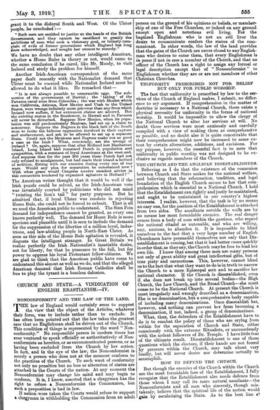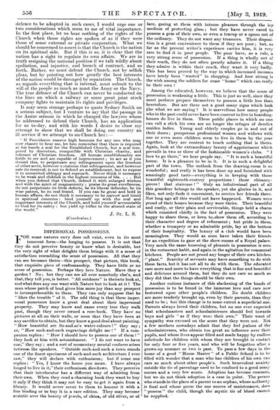CHURCH: MU) STATE.—A, VINDICATION OF ENGLISH ERASTIANISM:—IV.
NONCONFORMITY AND TRH LAW OF THE LAND.
THE law of England would certainly seem to support the view that the object of the Articles, whatever their form, was to include rather than to exclude.- It has often been pointed out that the law takes the greatest care that no Englishman shall be driven out of the Church. This condition of things is represented by the word " Non- conformity." No responsible person in modern times has ever ventured to speak officially or authoritatively of Non- conformists as heretics, or as excommunicated persons, or as having been excluded- from. the Church by her action. In fact, and in the eye of the law, the Nonconformist is merely a person who does not at the moment conform to the practices of the Church. To such want of conformity not only no penalties but no loss or alteration of status are attached in the Courts of the nation. At any moment the Nonconformist may change his mind and may begin to conforni. It is, I know, asserted that a clergyman has the right to refuse- a Nonconformist the Communion, but such a proposition is bad in law.
If elation -were taken the Courts would refuse to support a clergyman in withholding the Communion from an adult
person on the ground of his opinions or beliefs, or-member. ship of one of the Free Churches, or indeed on any ground except open and notorious evil living. For the baptized Englishman who is not an evil liver the desire to communicate confers the status of the com- municant. In other words, the law of the land provides that the gates of the Church are never closed to anyEnglish- man who desires to enter them, that every Englishman is is posse if not in ease a member of the Church, and that no officer of the Church has a right to. assign any formal or legal description except that of " Nonconformist" to Englishmen whether they are or are not members of other Christian Churches.
UNIFORMITY PRESCRIBED NOT FOR BELIEF BUT. ONLY FOR PUBLIC WORSHIP.
The fact that uniformity is prescribed by law to the ser- vices of the Church of England makes, I submit, no differ- ence to my argument. If comprehension- in the matter of doctrine is necessary to a National Church, there exists a physical necessity for uniformity in the forms of national worship. It would be impossible to allow- the clergy of the National Church to alter her services at will. No doubt those services were most anxiously and carefully compiled with a view of making them as comprehensive as possible, and no doubt also it is quite conceivable that their comprehension might now be- increased to some ex- tent by certain alterations, additions, and excisions. For my purpose, however, the essential fact is to note that uniformity in public worship was not designed to be ex- clusive as regards members of the Church.
THE t.MURCH AND THE ANGLICAN DISESTABLISHERS.
Believing as I do that the existence of the connexion between Church and State makes for the national welfare, and believing that the reformation, tradition, and legal foundation of the English Church secure to her that com- prehension which is essential to a National- Church, I hold that the Establishment can rightly and justly be maintained, and ought to be maintained in our country's highest interests. I realize, however, that the task is by no means an easy one, for the position of the Establishment is-attacked from two sides. The assailants outside the walls are by no means her moat formidable enemies. The real danger comes from a body of men within the garrison, who regard the national citadel as untenable, and who- are willing, nay, anxious, to abandon it. It is impossible to blind ourselves to the• fact that a very large number of English Churchmen have persuaded themselves not only that Dis- establishment is coming, but thatit had better come quickly in order that, as they say, the Church maybe free to lead her own life. I knew that among these men are many persons not only of great ability and great intellectual gifts, but of true piety and earnestness. This, however, cannot blind us to the fact that what they want to do is in truth to narrow the Church to a mere Episcopal sect and to sacrifice her national character. If the Church is disestablishedi even if. she does not break up into several bodie' a,--the High Church, the Low Church, and the Broad Church—she must cease to be the National Church. At present' the. Church is most irregularly and.wrongly described as a denomination. She is no denomination, but a comprehensive body capable of including many denominations. Once disestablish her, however, and nothing can prevent her from becoming a denemination,. if not, indeed, a group of denominations.
What, then, the defenders of the Establishment have to do is to combat the policy of those who are crying from within for the separation of Church and. State, , either consciously with the extreme Ritualists, or unconsciously with the ardent followers of Dr. Temple. I have little fear of the ultimate result. Disestablishment is one of those questions which the electors, if their hands are not forced by pressure within the Church, may talk about very loudly, but will never desire nor determine• actually to accomplish.
HOW TO DEFEND THE CHURCH-
But though the enemies of the Church within the Church are the most formidable foes of the Establishment, I fully recognize that the Establishment also needs defence from those whom I may call its more natural aasailants--the Nonconformists and all men who sincerely, though mis- takenly, believe that the spiritual life of the nation would gain by secularizing the State. As to the best line tt-% defence to be adopted in such cases, I would urge one or two considerations which seem to me of vital importance. In the first place, let us hear nothing of the rights of the Church when those rights are spoken of as if they were those of some external or private corporation. What we should be concerned to assert is that the Church is the nation on its spiritual side. But if this is so, it is clear that the nation has a right to regulate its own affairs. We are in truth resigning the national position if we talk wildly about spoliation, and injustice, and breach of contract, and so forth. Rather, we mush defend the Church, not by selfish pleas, but by pointing out how greatly the best interests of the nation would be damaged by separation. The Church, as regards everything that is internal, must submit to the will of the people as much as must the Army or the Navy. The true defence of the Church can never be conducted on the lines on which a railway or some great joint stock company fights to maintain its rights and privileges.
It may seem strange perhaps to quote Sydney Smith on a serious subject, but I venture to say that the passage in the Assize sermon in which he charged the lawyers whom he addressed to defend their Church, has an application for us to-day, and with his words I desire to close my attempt to show that we shall be doing our country an ill service if we attempt to un-Church her:
" If Providence reserve high honours for any one who may now chance to hear me, let him remember that there is required at his hands a zeal for the Established Church, but a zeal tem- pered by discretion, compatible with Christian charity, and tolerant of Christian freedom. Alt human establishments are liable to err and are capable of improvement ; to act as if you denied this, to perpetuate any infringement upon the freedom of other sects, however vexatious that infringement, and however safe its removal, is not to defend an establishment, but to expose it to unmerited obloquy and reproach. Never think it necessary to be weak and childish in the highest concerns of life. . . . But when you defend that Church, defend it with enlarged wisdom and with the spirit of magnanimity ; praise its great excellences, do not perpetuate its little defects, be its liberal defender, be its wise patron, be its real friend. If you can be great and bold in human affairs, do not think it necessary to be narrow and timid in spiritual concerns : bind yourself up with the real and important interests of the Church, and hold yourself accountable to God for its safety : but yield up trifles to the altered state of the world."
(Coniquaion.)
J. Sr. L. S.



































 Previous page
Previous page